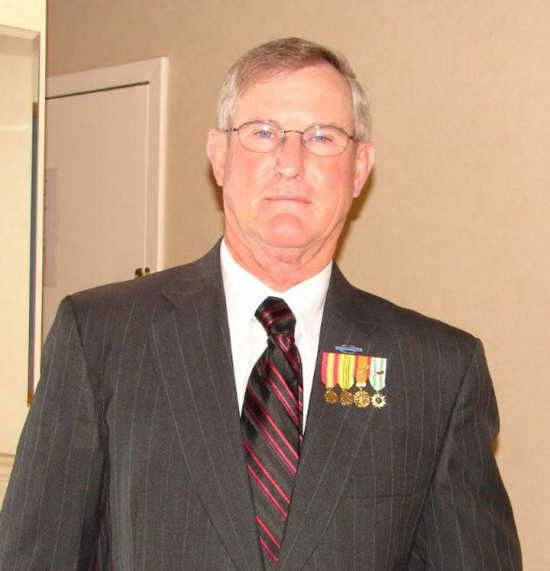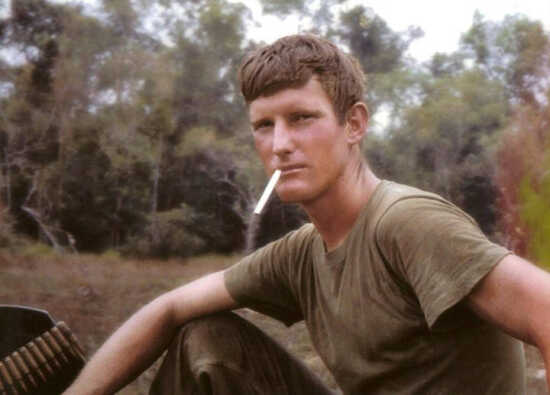Wednesday, November 4, 2009
 |
| Larry Toole, formerly of Gideon, Mo., along with his Army unit from the Vietnam War, was recently awarded one of the nation's highest awards for the daring rescue of another Army unit. Photos provided |
WASHINGTON -- A former Gideon, Mo., man and his Vietnam unit were recently awarded one of the nation's highest honors for their daring rescue of fellow soldiers during the Vietnam War.
The Presidential Unit Citation was presented to Troop A, 1st Squadron of the 11th Armored Combat Regimine (Alpha Troop) by President Barack Obama during a Rose Garden ceremony at the White House on Tuesday, Oct. 20, 2009.
The soldiers, including former Southeast Missouri native Larry Toole, received the award for their March 26, 1970 rescue of nearly 100 members of another unit who had stumbled onto a large underground enemy bunker.
 |
| Toole while serving his tour of duty in the Vietnam War. |
Toole, who was born and raised just outside Gideon, said he was drafted into the Army at the age of 18, and by late December 1969, he was assigned to the 1st Squadron of the 11th Armored Combat Regimine, a mechanized Infantry unit located in Tannin province of South Vietnam.
"During that year my unit was engaged in many firefights," Toole said. "We also were part of the invasion force that went into Cambodia.
"When I got out of the Army in 1971, I put away my uniform and tried to forget everything I experienced as a young man not even old enough to by a drink.
"I have never before discussed the details of the events that occurred during my 11 months and 20 day tour of duty in Vietnam with anyone, not even my wife of 40 years."
According to Toole, in March 1970, his unit was doing a recon mission in War Zone C between the Black Virgin Mountains and the Cambodian border. He said there were two fire support bases in the general area, one being Fire Base Carolyn and the other being Fire Base Illingworth.
"This was considered a hostile region with no civilians in the area," Toole said. "We called it a free fire zone, meaning we didn't have to have authorization to engage a target."
Toole said on March 25, 1970, after his unit had set up their site near the Cambodian border, he was awaked by a "loud explosion and a flash nearby."
"It was total chaos for a few minutes as we began firing and moving forward off line," Toole said. "After a few minutes, we were told to cease fire and we learned that we weren't under attack, but that a four-duce mortar round had exploded in the tube killing two of our mortar crewmen. We set up at a safe distance and watched helplessly as a mortar track, propellant charges and mortar rounds burned and exploded.
"After things cooled down enough, A-17 moved back to near the burned out track. It was still dark as I helped collect the remains of our deceased soldiers."
Toole said as daylight broke, the unit set up a new site a few hundred meters away.
"Next thing I remember, we were told to get prepared to move out in short order," Toole said. "On the way, I learned what the mission objective was. We were to attempt to rescue a company of 1st Cavalry soldiers that was pinned down and surrounded by a battalion of [the North Vietnamese Army] equipped with heavy weapons.
"It was mid-afternoon and we were busting through dense jungle fast, something we normally would never do. We always busted jungle carefully to avoid being strung out and to more easily protect our flanks. Anyway, we were in a big hurry; I don't remember who the lead tanks were, just that it wasn't us."
Toole said as the unit moved deeper into the jungle, they began to see enemy fighting positions comprised of underground bunkers connected by deep trenches.
"At this point, I was told by my TC to get into my gunners seat and get prepared to fire, which I did," Toole said. "A moment later, I heard the distinct whoosh of an RPG being fired and a second later a loud explosion. Next, the ringing sound of enemy machine gun and small arms fire hitting the turret. At that moment, everybody opened up with machine guns."
Toole said he remembered his Captain, John Poindexter, on the radio telling the unit to close up and turn out.
"We were laying down as much fire as possible," Toole said. "I could see through my gunner's sight that we had a couple of concealed bunkers to the front of our position and that we were receiving heavy machine gun fire from them.
"We kept pounding their bunker openings with .50 cal. and 155MM canister rounds from the main gun. We managed to take out several of the enemy positions on the perimeter of the bunker complex and we were able to push deeper. I knew we were taking casualties because I could hear calls coming over the radio for a medic. I also knew we were inflicting casualties on the enemy.
"After about and hour of fighting, we were able to penetrate deep enough into the enemy fortifications to secure the position of the 1st Cavalry soldiers that we had come to rescue. We were still receiving heavy resistance from the enemy. It was beginning to get late in the afternoon and we had expended most of our main gun rounds."
"Next thing I remember was somebody on the horn telling us to keep firing but to back off line," Toole said. "I knew something was wrong when it was not the CO who was on the radio barking orders. We pulled back a short distance but were still receiving quite a bit of small arms and machine gun fire.
"I heard that track A-19 had been taken out by an RPG to the right side of the turret. The TC and the gunner later were moved to a field hospital. Luckily no casualties on A-17 though. The TC on A-19 on that day was a guy that I knew as 'Tennessee'.
"This story isn't about me as an individual. It should be about a group of young men that were able to pull off a daring rescue that saved the lives of some one hundred solders of Charlie Co.
"Our unit also paid a heavy price as we lost two of our men and some 27 wounded before we were able to push the enemy back and get the survivors, and the dead and wounded of Charlie Co. out.
"These vets were often shunned and neglected, even demonized when they came home," Obama said of Vietnam War fighters. "That was a national disgrace. And on days such as this, we resolve to never let it happen again.
"If that day in the jungle, if that war long ago teaches us anything, then surely it is this: If we send our men and women in uniform into harm's way, then it must be only when it is absolutely necessary. And when we do, we must back them up with the strategy and the resources and the support they need to get the job done."
President Obama quotes used in this article were provided by the Associated Press.




No comments:
Post a Comment